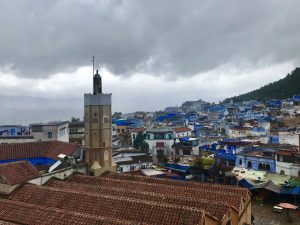When I first arrived to study abroad in Granada, Spain, it took a few weeks to get acclimated to the way Spanish is spoken here. The Spanish accent seemed a lot stronger to me, compared to some Latin-American accents. What’s more, the Granadino accent can be particularly thick. It definitely takes some getting used to, but after four months, I definitely understand so much better, and I have even picked up on several local sayings and expressions. Below, I share some of the most common ones and some of my favorites to help future students get an early advantage on speaking in true Granadino style.
While some of my definitions and pronunciation notes might seem a little odd, it's because you're trying to read it. I've tried my best to communicate the idiosyncrasies and colloquialisms of the Spanish I hear in Granada, but of course it won't make complete sense until you actually hear it. Spanish as a language came alive for me when I came to Granada and started hearing it all around me all the time. So what are you waiting for? Come to Spain and hear it for yourself; experience how Spanish comes alive.
Anastasia K. is the Spring 2018 MOJO in Granada, Spain. She is currently a Junior studying English at Liberty University.
 |
|
weekly intercambios, or language exchanges, are a |
In Conversation/Expressions:
- vale: "OK"
- entonces, pues: "then," "well"
- can be used literally, but more often as a sentence-starter or pause-filler
- mas o menos: "more or less"
- *pronunciation: “mao’meno”
- da igual: "doesn't matter to me," "same either way"
- no pasa nada = "no big deal," "don't worry about it"
- *the quintessential southern Spanish phrase that embodies the relaxed lifestyle and attitude of the people here
- no me digas/anda
- literally: "don't tell me!" "walk!"
- really means: "You're joking/kidding!" "No way!" "Get out of here!"
- used to express surprise
- hombre, mujer, tío
- literally: "man, woman, uncle"
- really means: man, dude
- example: "Venga, tío" loosely translates to "Come on, man" used in a joking or irritated manner
 |
| ¡Anda! - what I said when there was not one, but two peacocks on our trip to the Carmen de los Mártires |
Vocabulary:
- gracioso: "funny"
- enfadado: "mad, angry"
- tiquismiquis: "picky, fussy" (with food)
- coger: in Spain, a synonym for "tomar" (in other words, not what it means in Latin America)
- la calle: "the street"
- *meaning: while "la calle" is a normal, everyday word, it means so much more; in Spain, "la calle" is the social epicenter of everyday life and activity
 |
| I learned the word "tiquismiquis" very early on in my host stay experience, but because I wanted to communicate to my host mom that I wasn't picky; I mean , who could be when there's paella? |
In Class:
- todo el mundo
- literally: "the whole world"
- meaning: while this would by a hyperbole in English, in Spanish, it simply means "everyone"
- example: many times, a professor will ask if "todo el mundo" is present or if "todo el mundo" has turned in an assignment
- ni idea: "no idea"
- a more colloquial and emphatic way to say "I don't know"
- fíjate: "pay attention," "listen up"
- this is not used in a mean way, but rather a "I'm about to tell you something important, something you need to remember"
Salutations:
- ya está: "that's all," "that's it"
- used as a conversation closer
- hasta luego: "see you later," "until next time"
- *pronunciation: "'(s)ta'wego"
 |
| when you can't decide which tapa to try first, "da igual" - because they are all delicious |
While some of my definitions and pronunciation notes might seem a little odd, it's because you're trying to read it. I've tried my best to communicate the idiosyncrasies and colloquialisms of the Spanish I hear in Granada, but of course it won't make complete sense until you actually hear it. Spanish as a language came alive for me when I came to Granada and started hearing it all around me all the time. So what are you waiting for? Come to Spain and hear it for yourself; experience how Spanish comes alive.
 |
| even though it rained our last day in Morocco, no pasa nada - we were in Morocco! |
Anastasia K. is the Spring 2018 MOJO in Granada, Spain. She is currently a Junior studying English at Liberty University.










